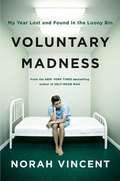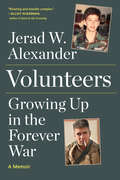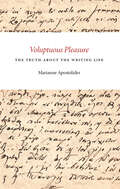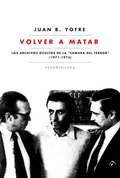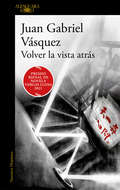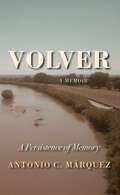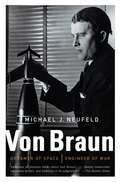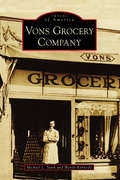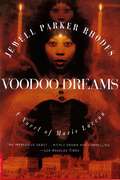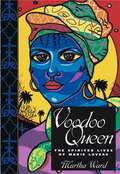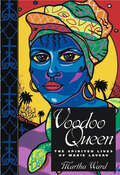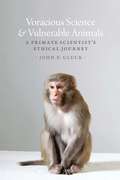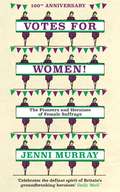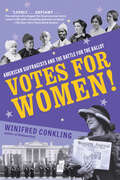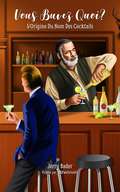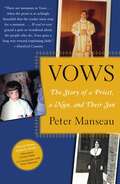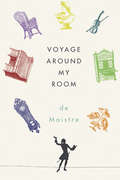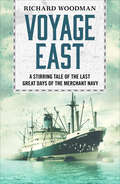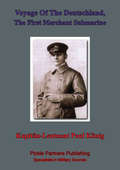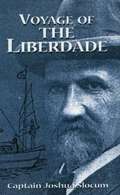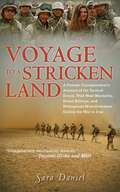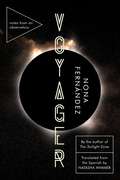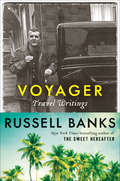- Table View
- List View
Voluntary Madness: My Year Lost and Found in the Loony Bin
by Norah VincentThe journalist who famously lived as a man commits herself literally. Norah Vincent's New York Times bestselling book, Self-Made Man, ended on a harrowing note. Suffering from severe depression after her eighteen months living disguised as a man, Vincent felt she was a danger to herself. On the advice of her psychologist she committed herself to a mental institution. Out of this raw and overwhelming experience came the idea for her next book. She decided to get healthy and to study the effect of treatment on the depressed and insane in the bin, as she calls it. Vincent's journey takes her from a big city hospital to a facility in the Midwest and finally to an upscale retreat down south, as she analyzes the impact of institutionalization on the unwell, the tyranny of drugs-as-treatment, and the dysfunctional dynamic between caregivers and patients. Vincent applies brilliant insight as she exposes her personal struggle with depression and explores the range of people, caregivers, and methodologies that guide these strange, often scary, and bizarre environments. Eye opening, emotionally wrenching, and at times very funny, Voluntary Madness is a riveting work that exposes the state of mental health care in America from the inside out.
Volunteer Slavery: My Authentic Negro Experience
by Jill Elizabeth NelsonWhen Jill Nelson became the first black woman to write for The Washington Post's prestigious Sunday magazine in 1986, she thought she had entered journalism heaven. But the magazine proved to be insulting to black readers.
Volunteers: Growing Up in the Forever War
by Jerad W. Alexander&“Riveting and morally complex, Volunteers is not only an insider&’s account of war. It takes you inside the increasingly closed culture that creates our warriors.&” —Elliot Ackerman, author of the National Book Award finalist Dark at the Crossing As a child, Jerad Alexander lay in bed listening to the fighter jets take off outside his window and was desperate to be airborne. As a teenager at an American base in Japan, he immersed himself in war games, war movies, and pulpy novels about Vietnam. Obsessed with all things military, he grew up playing with guns, joined the Civil Air Patrol for the uniform, and reveled in the closed and safe life &“inside the castle,&” within the embrace of the armed forces, the only world he knew or could imagine. Most of all, he dreamed of enlisting—like his mother, father, stepfather, and grandfather before him—and playing his part in the Great American War Story. He joined the US Marines straight out of high school, eager for action. Once in Iraq, however, he came to realize he was fighting a lost cause, enmeshed in the ongoing War on Terror that was really just a fruitless display of American might. The myths of war, the stories of violence and masculinity and heroism, the legacy of his family—everything Alexander had planned his life around—was a mirage. Alternating scenes from childhood with skirmishes in the Iraqi desert, this original, searing, and propulsive memoir introduces a powerful new voice in the literature of war. Jerad W. Alexander—not some elite warrior, but a simple volunteer—delivers a passionate and timely reckoning with the troubled and cyclical truths of the American war machine.
Voluptuous Pleasure: The Truth About the Writing Life
by Marianne ApostolidesVoluptuous Pleasure: The Truth about the Writing Life is a collection of non-fiction whose title states that non-fiction does not exist. These stories, by acclaimed author Marianne Apostolides, are sensuous and smart, ambiguous but incisive in their truths. Voluptuous Pleasure will take you inside brothels and bedrooms, kitchens and consciousness; it will seduce you along the limits of non-fiction, making you question the veracity of anything you’ve ever read – or even experienced.
Volver a matar: Los archivos ocultos de la "Cámara del terror" (1971-1973)
by Juan B. Yofre"El setentismo es la subversión, simplemente, hay que decirlo con todaslas palabras ("). "Es querer hacer la revolución por medios violentos."Raúl R. Alfonsín (Diario Perfil, 2-IX-2007) Volver a matar es la historia de una época terrible de la RepúblicaArgentina. Narra el inicio de la "guerra popular prolongada" que lasorganizaciones terroristas declararon a todos los estamentos del EstadoNacional, bajo la inspiración del castro-comunismo. Pero el libro seocupa, fundamentalmente, de la forma en que el Estado argentino lascombatió con la ley en la mano a partir de julio de 1971, cuando creó laCámara Federal en lo Penal de la Nación. El tiempo de esta Cámara "a laque la subversión llamó despectivamente "Camarón" o "Cámara del terror"fue muy corto, duró hasta el 25 de mayo de 1973, día en que conviolencia se abrieron las rejas de las cárceles y los presos volvieron asus organizaciones clandestinas para sembrar la muerte, aún en una épocade gobierno constitucional.Por primera vez el lector conocerá algunos de los numerosos casos quetrató el alto tribunal, compuesto por jurisconsultos de largatrayectoria. Ellos triunfaron pero también perdieron. Impusieron la ley,no hubo represión ilegal, pero luego, con el gobierno de Héctor J.Cámpora, fueron perseguidos, degradados, sufrieron atentados o tuvieronque exiliarse.Tras la ley de amnistía "amplia y generosa", José Alberto Deheza, exministro de Justicia y de Defensa de Isabel Martínez de Perón, declaró:"No soy contrario a la ley del olvido, pero una ley que libera a simplesasesinos que sembraron el terror matando a mansalva en nombre de idealesrevolucionarios, importa una grave irresponsabilidad. En la mayor partede los casos, se trataba de componentes de bandas clandestinas queemboscaban a sus víctimas para ultimarlas con perversidad".Volver a matar se sumerge en un archivo secreto que muchos intentarondestruir, pero que fue salvado para las generaciones futuras.Testimonios inéditos y documentos confidenciales desconocidos hasta hoyabonan lo afirmado. Una vez más, como lo hiciera en "Nadie fue" y en"Fuimos todos", Juan B. Yofre brinda aquí un aporte fundamental anuestra historia reciente y rinde su homenaje a la memoria completa delos argentinos.
Volver la vista atrás
by Juan Gabriel VásquezEl nuevo libro del premio Alfaguara de novela: un relato «sin ficción» sobre las relaciones entre padres e hijos marcadas por las ideas políticas y el fanatismo. «Pensó que los recuerdos eran invisibles como la luz, y así como el humo hacía que la luz se viera, debía haber una forma de que fueran visibles los recuerdos.» En octubre de 2016, el director de cine colombiano Sergio Cabrera asiste en Barcelona a una retrospectiva de sus películas. Es un momento difícil: su padre, Fausto Cabrera, acaba de morir; su matrimonio está en crisis, y su país ha rechazado unos acuerdos de paz que le habrían permitido terminar con más de cincuenta años de guerra. A lo largo de unos días reveladores, Sergio irá recordando los hechos que marcaron su vida y la de su padre. De la guerra civil española al exilio en América de su familia republicana, de la China de la Revolución Cultural a los movimientos armados de los años sesenta, el lector asistirá a una vida que es mucho más que una gran aventura: es una imagen de medio siglo de historia que trastornó al mundo entero. Volver la vista atrás cuenta hechos reales, pero sólo en manos de un novelista magistral como Vásquez podía convertirse en este retrato devastador de una familia arrastrada por las fuerzas de la historia. Una fascinante investigación social y a la vez íntima, política y a la vez privada, que el lector no olvidará. La crítica ha dicho:«Una novela maravillosa, muy contundente. Sentí que estaba leyendo un clásico. Juan Gabriel Vásquez es uno de los mejores escritores de habla hispana.»Leila Guerriero «Una de las voces más originales de la nueva literatura latinoamericana.»Mario Vargas Llosa «Volver la vista atrás está escrito con una envidiable plenitud de estilo y un portentoso control de la dosificación de impulsos novelísticos.»Sergi Pàmies, La Vanguardia «Una lúcida y sutil metáfora de cómo las ideologías marcaron las vidas privadas del siglo XX.»Andrés Seoane, El Cultural «Vásquez ha sucedido a García Márquez como el gran maestro literario de Colombia.»Ariel Dorfman, The New York Review of Books «Un magnífico y aterrador estudio sobre cómo el pasado puede invadir el presente, y una fascinante revelación de un rincón poco conocido del teatro de la guerra nazi.»John Banville (sobre Los informantes) «Un libro vívido, contundente, magistral.»Alberto Manguel, The Guardian (sobre Historia secreta de Costaguana) «Una novela cautivadora, que atrapa hasta el final. Si bien estamos ante un “vuelapáginas”, se trata también de una profunda meditación sobre el destino y la muerte.»Edmund White, The New York Times Book Review (sobre El ruido de las cosas al caer) «Uno sale de esta novela simplemente aturdido por la gran lección de literatura impartida por el autor.»Étienne de Montety, Le Figaro (sobre Las reputaciones) «Un gran libro [...] A ratos se lee como un thriller político. Es su obra más ambiciosa y la mejor hasta el momento.»Daniel Hahn, Prospect Magazine (sobre La forma de las ruinas) «Magnífico libro [...] Coherente, vertebrado, casi perfecto.»Nadal Suau, El Cultural (sobre Canciones para el incendio)
Volver: A Persistence of Memory
by Antonio C. MárquezBorn on the eve of World War II into a family of Mexican immigrants in El Paso, Antonio C. Márquez remains a child of the border, his life partaking of multiple cultures, countries, and classes. Here he recounts his life story, from childhood memories of movies and baseball and friendship with his Chinese Mexican American neighbor, Manuel Wong, to the turbulent events of his manhood. Márquez recalls the impact of immigration and war on his family; his experiences of gang conflict in El Paso and Los Angeles in the 1960s; enlisting in the Marine Corps; his activism in the civil rights movement, the antiwar movement of the Vietnam era, and the Crusade for Justice; and his travels to crisis-ridden Latin American countries. From a family where no one had the luxury of higher education, Márquez became a professor when universities hired few Chicanos. His is a story of survival and courage.
Von Braun: Dreamer of Space, Engineer of War
by Michael NeufeldCurator and space historian at the Smithsonian's National Air and Space Museum delivers a brilliantly nuanced biography of controversial space pioneer Wernher von Braun. Chief rocket engineer of the Third Reich and one of the fathers of the U.S. space program, Wernher von Braun is a source of consistent fascination. Glorified as a visionary and vilified as a war criminal, he was a man of profound moral complexities, whose intelligence and charisma were coupled with an enormous and, some would say, blinding ambition. Based on new sources, Neufeld's biography delivers a meticulously researched and authoritative portrait of the creator of the V-2 rocket and his times, detailing how he was a man caught between morality and progress, between his dreams of the heavens and the earthbound realities of his life.
Von Neumann, Morgenstern, and the Creation of Game Theory
by Robert LeonardDrawing on a wealth of new archival material, including personal correspondence and diaries, Robert Leonard tells the fascinating story of the creation of game theory by Hungarian Jewish mathematician John von Neumann and Austrian economist Oskar Morgenstern. Game theory first emerged amid discussions of the psychology and mathematics of chess in Germany and fin-de-sicle Austro-Hungary. In the 1930s, on the cusp of anti-Semitism and political upheaval, it was developed by von Neumann into an ambitious theory of social organization. It was shaped still further by its use in combat analysis in World War II and during the Cold War. Interweaving accounts of the period's economics, science, and mathematics, and drawing sensitively on the private lives of von Neumann and Morgenstern, Robert Leonard provides a detailed reconstruction of a complex historical drama.
Vons Grocery Company (Images of America)
by Michael L. Stark Wendy KennedyIn 1906, the downtown area of Los Angeles was fundamentally a small town when Charles Von der Ahe opened his little Groceteria on the corner of Seventh and Figueroa Streets using $1,200 in savings. It was a neighborhood store that catered to the needs of local families, where Von der Ahe pioneered "cash and carry," replacing the "charge and delivery" way of thinking. Its expansion and innovation over the next 90 years was legendary, growing to more than 325 stores and 30,000 employees. This book focuses on the legacy of this great company, its visionary leaders, and its dedicated employees who made it the number one grocery retailer in Southern California.
Voodoo Dreams: A Novel of Marie Laveau
by Jewell Parker RhodesNew Orleans in the mid-nineteenth century: a potent mix of whites, Creoles, free blacks, and African slaves, a city pulsing with crowds, commerce, and an undercurrent of secret power. The source of this power is the voodoo religion, and its queen is Marie Laveau, the notorious voodooienne, worshipped and feared by blacks and whites alike. A mesmerizing combination of history, oral tradition, and storytelling, Voodoo Dreams reimagines the woman behind an enduring American legend. Jewell Parker Rhodes's novel is a memorable, magical debut.
Voodoo Queen: The Spirited Lives of Marie Laveau
by Martha WardEach year, thousands of pilgrims visit the tomb of Marie Laveau in New Orleans. In this old city she and her curse long have ruled the imagination. She has been conjured in dance, drumming, song, and necromancy. With dread and fierce affection, her celebrants ask for her favors and fearfully revere her enduring authority as "the Voodoo Queen." Who was Marie Laveau? This book about her mysterious life, magical deeds, and pervasive power recounts that there were two historical figures by this name, a mother and a daughter. They were free women of color, prominent French-speaking Catholic Creoles, and legendary leaders of a religious and spiritual tradition that orthodox faiths label as evil. From the 1820s until the 1880s, when one Marie died and the other disappeared, a mixture of gossip and devotion swirled about them.
Voodoo Queen: The Spirited Lives of Marie Laveau
by Martha WardEach year, thousands of pilgrims visit the celebrated New Orleans tomb where Marie Laveau is said to lie. They seek her favors or fear her lingering influence. Voodoo Queen: The Spirited Lives of Marie Laveau is the first study of the Laveaus, mother and daughter of the same name. Both were legendary leaders of religious and spiritual traditions many still label as evil. The Laveaus were free women of color and prominent French-speaking Catholic Creoles. From the 1820s until the 1880s when one died and the other disappeared, gossip, fear, and fierce affection swirled about them. From the heart of the French Quarter, in dance, drumming, song, and spirit possession, they ruled the imagination of New Orleans. How did the two Maries apply their “magical” powers and uncommon business sense to shift the course of love, luck, and the law? The women understood the real crime—they had pitted their spiritual forces against the slave system of the United States. Moses-like, they led their people out of bondage and offered protection and freedom to the community of color, rich white women, enslaved families, and men condemned to hang. The curse of the Laveau family, however, followed them. Both loved men they could never marry. Both faced down the press and police who stalked them. Both countered the relentless gossip of curses, evil spirits, murders, and infant sacrifice with acts of benevolence. The book is also a detective story—who is really buried in the famous tomb in the oldest “city of the dead” in New Orleans? What scandals did the Laveau family intend to keep buried there forever? By what sleight of hand did free people of color lose their cultural identity when Americans purchased Louisiana and imposed racial apartheid upon Creole creativity? Voodoo Queen brings the improbable testimonies of saints, spirits, and never-before-printed eyewitness accounts of ceremonies and magical crafts together to illuminate the lives of the two Marie Laveaus, leaders of a major, indigenous American religion.
Voracious Science & Vulnerable Animals: A Primate Scientist's Ethical Journey (Animal Lives Ser.)
by John P. GluckThe National Institute of Health recently announced its plan to retire the fifty remaining chimpanzees held in national research facilities and place them in sanctuaries. This significant decision comes after a lengthy process of examination and debate about the ethics of animal research. For decades, proponents of such research have argued that the discoveries and benefits for humans far outweigh the costs of the traumatic effects on the animals; but today, even the researchers themselves have come to question the practice. John P. Gluck has been one of the scientists at the forefront of the movement to end research on primates, and in Voracious Science and Vulnerable Animals he tells a vivid, heart-rending, personal story of how he became a vocal activist for animal protection. Gluck begins by taking us inside the laboratory of Harry F. Harlow at the University of Wisconsin, where Gluck worked as a graduate student in the 1960s. Harlow’s primate lab became famous for his behavioral experiments in maternal deprivation and social isolation of rhesus macaques. Though trained as a behavioral scientist, Gluck finds himself unable to overlook the intense psychological and physical damage these experiments wrought on the macaques. Gluck’s sobering and moving account reveals how in this and other labs, including his own, he came to grapple with the uncomfortable justifications that many researchers were offering for their work. As his sense of conflict grows, we’re right alongside him, developing a deep empathy for the often smart and always vulnerable animals used for these experiments. At a time of unprecedented recognition of the intellectual cognition and emotional intelligence of animals, Voracious Science and Vulnerable Animals is a powerful appeal for our respect and compassion for those creatures who have unwillingly dedicated their lives to science. Through the words of someone who has inflicted pain in the name of science and come to abhor it, it’s important to know what has led this far to progress and where further inroads in animal research ethics are needed.
Votes For Women!: The Pioneers and Heroines of Female Suffrage (from the pages of A History of Britain in 21 Women)
by Jenni MurrayMary Wollstonecraft, Elizabeth Garrett Anderson, Millicent Fawcett, Emmeline Pankhurst, Constance Markievicz, Nancy Astor They terrorised the establishment. They fought for the vote. They pushed back boundaries and revolutionised our world. For the hundredth anniversary of the historic moment the franchise was finally extended to women, here is a selection of suffragette and suffragist activists and pioneering MPs from the pages of Jenni Murray&’s bestselling A History of Britain in 21 Women. Set against the backdrop of a world where equality is still to be achieved, it is a vital reminder of the great women who fought for change.
Votes for Women!: American Suffragists and the Battle for the Ballot
by Winifred ConklingFor nearly 150 years, American women did not have the right to vote. On August 18, 1920, they won that right, when the 19th Amendment to the Constitution was ratified at last. To achieve that victory, some of the fiercest, most passionate women in history marched, protested, and sometimes even broke the law—for more than eight decades. From Susan B. Anthony and Elizabeth Cady Stanton, who founded the suffrage movement at the 1848 Seneca Falls Convention, to Sojourner Truth and her famous “Ain’t I a Woman?” speech, to Alice Paul, arrested and force-fed in prison, this is the story of the American women’s suffrage movement and the private lives that fueled its leaders’ dedication. Votes for Women! explores suffragists’ often powerful, sometimes difficult relationship with the intersecting temperance and abolition campaigns, and includes an unflinching look at some of the uglier moments in women’s fight for the vote. By turns illuminating, harrowing, and empowering, Votes for Women! paints a vibrant picture of the women whose tireless battle still inspires political, human rights, and social justice activism.
Vous Buvez Quao?: L'Origine Du Nom Des Cocktails
by Jerry BaderVous Buvez Quao? L'Origine Du Nom Des Cocktails Publié par MRPwebmedia Pourquoi nomme-t-on les boissons à base d’alcool ‘cocktails’? D’où tirent-ils leur nom exotique: des noms comme Singapore Sling, Screwdriver, Alamagoozlum, Angel’s Kiss, Hanky Panky, Harvey Wallbanger, Sex On The Beach, Monkey Gland, Brass Monkey, Margarita, Japalac, Lion’s Tail, et bien d’autres encore ? Qui a trouvé leur nom, où ont-ils été inventés, pourquoi, et comment les réaliser? Les réponses à ces questions se trouvent dans Vous buvez quoi? un panorama à travers des faits, personnes et lieux qui entrent dans le processus de création de ces préparations exotiques.
Vows: The Story of a Priest, a Nun, and Their Son
by Peter ManseauThe 1950s was a boom time for the Catholic Church in America, with large families of devout members providing at least one son or daughter for a life of religious service. Boston was at the epicenter of this explosion, and Bill Manseau and Mary Doherty -- two eager young parishioners from different towns -- became part of a new breed of clergy, eschewing the comforts of homey parishes and choosing instead to minister to the inner-city poor. Peter Manseau's riveting evocation of his parents' parallel childhoods, their similar callings, their experiences in the seminary and convent, and how they met while tending to the homeless of Roxbury during the riot-prone 1960s is a page-turning meditation on the effect that love can have on profound faith. Once married, the Manseaus continued to fight for Father Bill's right to serve the church as a priest, and it was into this situation that Peter and his siblings were born and raised to be good Catholics while they witnessed their father's personal conflict with the church's hierarchy. A multigenerational tale of spirituality, Vows also charts Peter's own calling, one which he tried to deny even as he felt compelled to consider the monastic life, toying with the idea of continuing a family tradition that stretches back over 300 years of Irish and French Catholic priests and nuns. It is also in Peter's deft hands that we learn about a culture and a religion that has shaped so much of American life, affected generations of true believers, and withstood great turmoil. Vows is a compelling tale of one family's unshakable faith that to be called is to serve, however high the cost may be.
Voyage Around My Room
by Richard Howard Stephen Sartarelli Joseph De Maistre Xavier De MaistreA lively and utterly singular travelogue of the intricate curiosities that are directly within one’s own reach In 1790, while serving in the Piedmontese army, the French aristocrat Xavier de Maistre (1763–1852) was punished for dueling and placed under house arrest for forty-two days. The result was a discursive, mischievous memoir Voyage Around My Room, and its sequel, Nocturnal Expedition Around My Room. Admired by Nietzsche and Machado de Assis, Ossian and Susan Sontag, this classic book proves that sitting on the living-room sofa can be as fascinating as crossing the Alps or paddling up the Amazon. In addition to the Voyage and Expedition, this edition also includes the dialogue “The Leper of the City of Aosta,” a preface by Xavier’s better-known older brother (the royalist philosopher Joseph de Maistre), and an introduction by Richard Howard.
Voyage East
by Richard WoodmanA stirring tale of life aboard ship during the last great days of the Merchant NavyNew junior officer Laddie signs on to the cargo liner Antigone on a voyage to the Far East. He finds himself part of a crew who all have their own stories to tell about life at sea.Over the course of the eventful journey to Hong Kong and Singapore, he comes to know them all, from Captain ‘China Dick’ Richards and the experienced and remote Master to the vulnerable young radio officer Sparks and the deck crew.Little does Laddie know, but this voyage will be a turning point for Antigone and all who sail in her...Perfect for fans of Patrick O’Brian and Dewey Lambdin, Richard Woodman draws upon his six years of service on ships to evocatively capture life aboard.
Voyage Of The Deutschland, The First Merchant Submarine
by Kapitänleutnant Paul KönigThe arrival of the submarine Deutschland in the harbour of New York in July of 1916 produced one of the sensation of the year. How had a U-Boat sailed all the way from Germany to the United States evading all of the counter-measures of the might Royal Navy and the even the U.S. coastal defences? The captain of the Deutschland, Paul König, was feted as a national hero in Germany and was lauded by those of German extraction in New York.He wrote this memoir of his famed journey from the inland waters of Germany all the way to the United States, it is filled with the dangers of the nascent submarine, in particular the fumes and heat of the diving compartment. Notable also the U-Boat had come as a merchantman, meaning that König was unarmed for combat and could only rely on deception to fulfill his mission to outwit his enemies.Author -- Kapitänleutnant Paul König (1867-1933)Text taken, whole and complete, from the edition published in New York, Hearst's international library co., 1916.Original Page Count - xii and 247 pages.
Voyage of the Liberdade
by Joshua SlocumIn 1890, the author became the first person to circumnavigate the globe alone. This is the account of one of his lesser-known but no less remarkable sea journeys. From the Publisher: Great 19th-century mariner's thrilling, account of the wreck of his ship off the coast of South America, the 35-foot brave little craft he built from the wreckage, and its remarkable, danger-fraught voyage home. A 19th-century maritime classic brimming with courage, ingenuity, and daring. Easy-to-read and fast-paced.
Voyage to a Stricken Land: A Female Correspondent's Account of the Tactical Errors, Wild West Mentality, Brutal Killings, and Widespread Misinformation During the War in Iraq
by Sara DanielIn June of 2002, war looms and Saddam Hussein still has a brutal grip on a nation in disarray. Sara Daniel travels the length and breadth of Iraq, following the fast-evolving events and interviewing people from all walks of life and all religious and political affiliations: from the Kurds in the north to the rising new politicians in Baghdad and beyond; from the insurgents in Sadr City and Fallujah to the police chief in Basra; from the hospital doctors tending the maimed and wounded to the directors of museums whose collections were ruthlessly pillaged; from ordinary men and women in the streets to those vying to fill the void of power; from American soldiers on deadly street patrol to the highest-ranking officers. Voyage to a Stricken Land offers a cogent, personal history of one of America's most controversial conflicts.
Voyager: Constellations of Memory
by Nona FernándezA startling book-length essay, at once grand and intimate, from National Book Award finalist Nona Fernández.Voyager begins with Nona Fernández accompanying her elderly mother to the doctor to seek an explanation for her frequent falls and inability to remember what preceded them. As the author stares at the image of her mother’s brain scan, it occurs to her that the electrical signals shown on the screen resemble the night sky.Inspired by the mission of the Voyager spacecrafts, Fernández begins a process of observation and documentation. She describes a recent trip to the remote Atacama desert—one of the world’s best spots for astronomical observation—to join people who, like her, hope to dispel the mythologized history of Chile’s new democracy. Weaving together the story of her mother’s illness with story of her country and of the cosmos itself, Fernández braids astronomy and astrology, neuroscience and memory, family history and national history into this brief but intensely imagined autobiographical essay. Scrutinizing the mechanisms of personal, civic, and stellar memory, she insists on preserving the truth of what we’ve seen and experienced, and finding ways to recover what people and countries often prefer to forget.In Voyager, Fernández finds a new container for her profound and surreal reckonings with the past. One of the great chroniclers of our day, she has written a rich and resonant book.
Voyager: Travel Writings
by Russell BanksThe acclaimed, award-winning novelist takes us on some of his most memorable journeys in this revelatory collection of travel essays that spans the globe, from the Caribbean to Scotland to the HimalayasNow in his mid-seventies, Russell Banks has indulged his wanderlust for more than half a century. In this compelling anthology, he writes that since childhood he has "longed for escape, for rejuvenation, for wealth untold, for erotic and narcotic and sybaritic fresh starts, for high romance, mystery, and intrigue." The longing for escape has taken him from the "bright green islands and turquoise seas" of the Caribbean islands to peaks in the Himalayas, the Andes, and beyond. In Voyager, Russell Banks, a lifelong explorer, shares highlights from his travels: interviewing Fidel Castro in Cuba; motoring to a hippie reunion with college friends in Chapel Hill, North Carolina; eloping to Edinburgh to marry his fourth wife, Chase; driving a sunset-orange metallic Hummer down Alaska's Seward Highway. In each of these remarkable essays, Banks considers his life and the world. In Everglades National Park, he traces his own timeline: "I keep going back, and with increasing clarity I see more of the place and more of my past selves. And more of the past of the planet as well." Recalling his trips to the Caribbean in the title essay, "Voyager," Banks dissects his relationships with the four women who would become his wives. In the Himalayas, he embarks on a different quest of self-discovery. "One climbs a mountain, not to conquer it, but to be lifted like this away from the earth up into the sky," he explains. Pensive, frank, beautiful, and engaging, Voyager brings together the social, the personal, and the historical, opening a path into the heart and soul of this revered writer."If the United States were to adopt Japan's admirable policy of designating a few extraordinary individuals as Living National Treasures, Russell Banks would be my first nomination."--Michael Cunningham"Russell Banks is a writer in the grand tradition. It is quite natural, in speaking of Banks's great works of fiction, to think of such predecessors as Conrad, Tolstoy, and Chekhov--and closer to his American home, such predecessors as Jack London, Theodore Dreiser, Hemingway, Dos Passos, Faulkner, and Nelson Algren. He has acquired an international reputation for the intensely wrought, uncompromising, and intransigent moral vision that has suffused virtually all of his work. He has created art of a kind that speaks to all classes, not merely to the elite, and yet has done so scrupulously and thoughtfully."--Joyce Carol Oates
